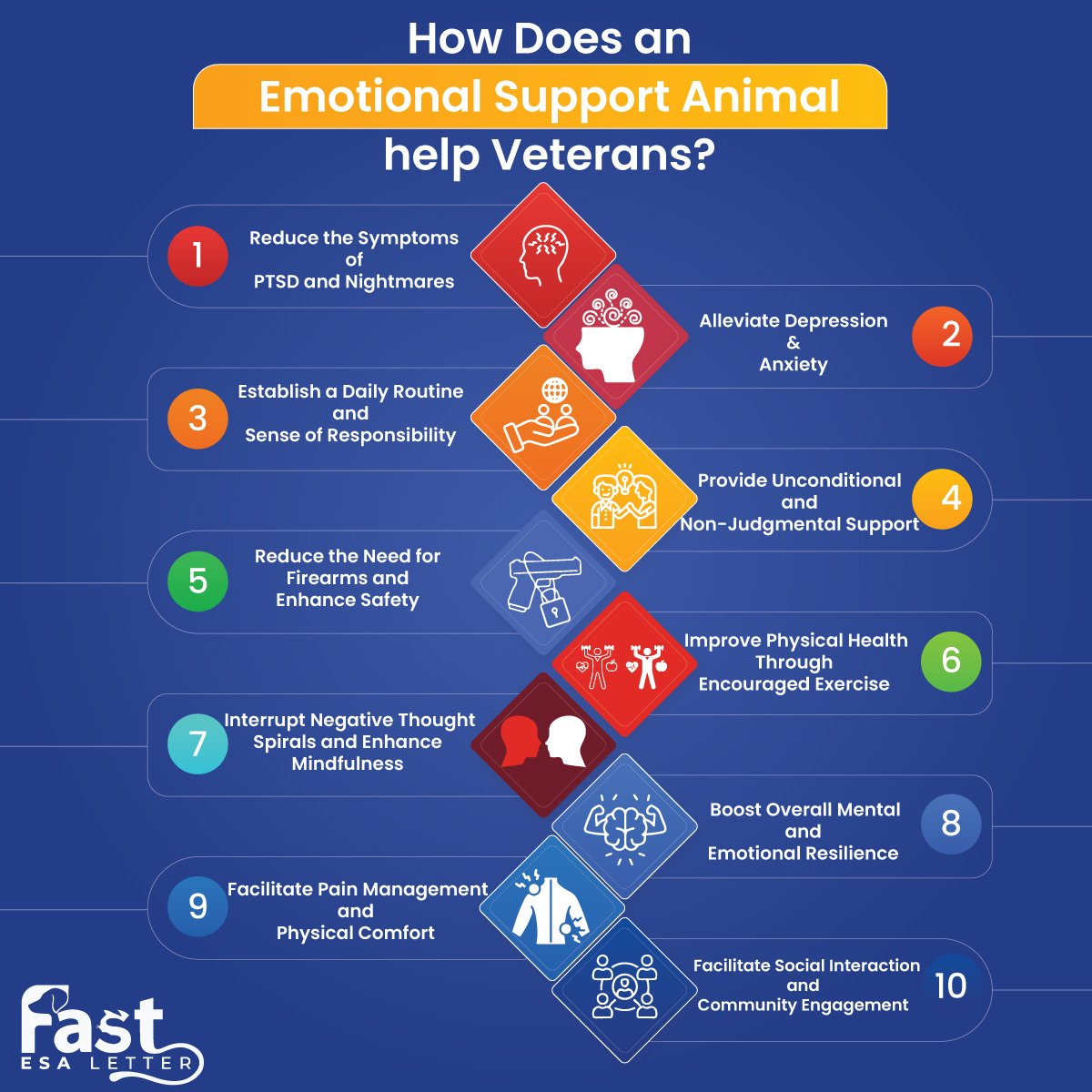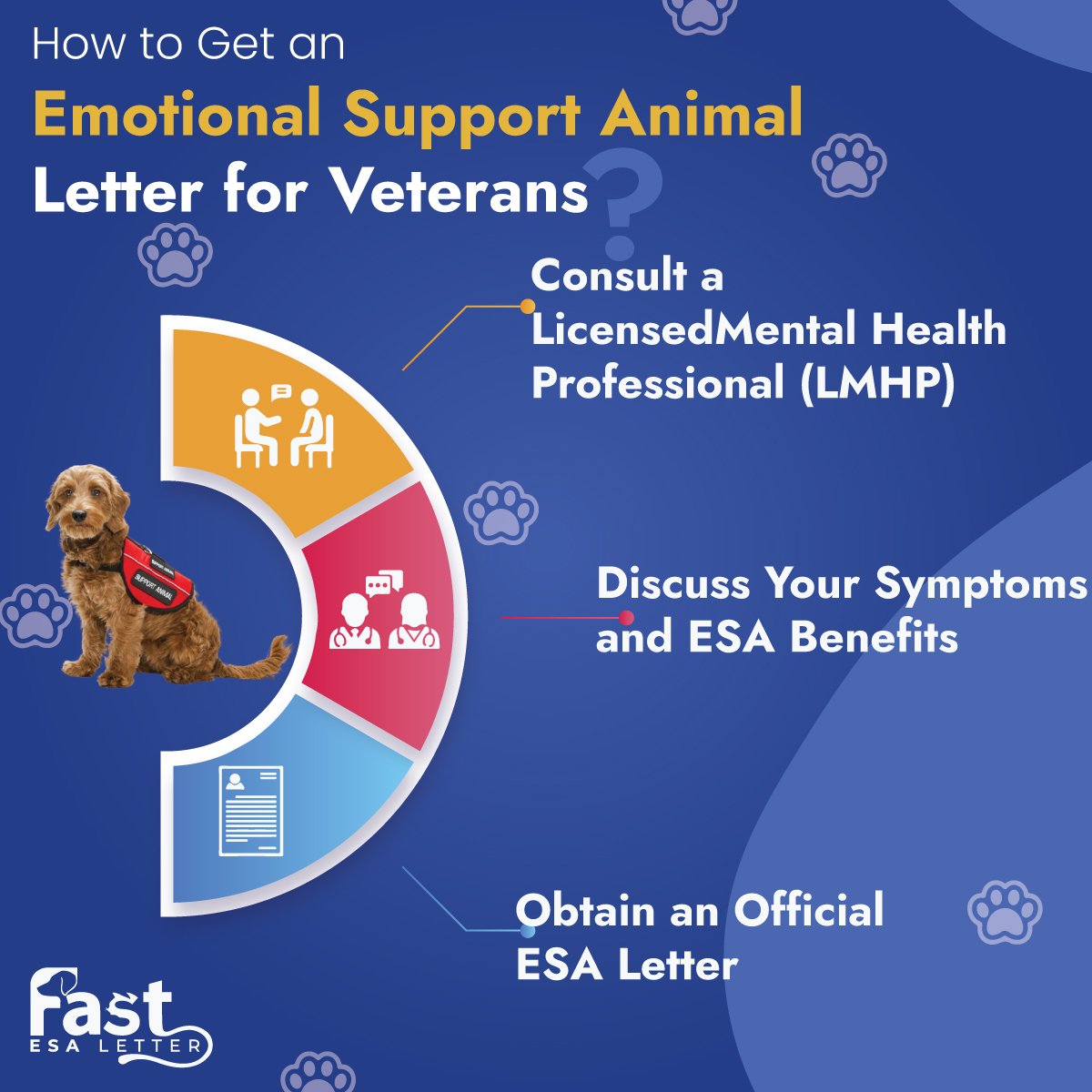How Emotional Support Animals Help Veterans Reclaim Peace After Service?

Beyond the battlefield, veterans face new challenges, ones without a clear mission or enemy. The transition to civilian life can be overwhelming, with emotional wounds that run just as deep as physical ones.
In these moments, Emotional Support Animals (ESAs) offer unwavering, non-judgmental companionship. Their presence alone can provide comfort, stability, and a sense of security.
If you’re a veteran wondering whether an Emotional Support Animal could help you regain a sense of normalcy and peace, you’re not alone. Countless veterans have found solace in their furry (or feathered) companions, and obtaining an ESA letter is more straightforward than you might think. In this guide, we’ll walk you through everything you need to know from the benefits of ESAs to how to get an emotional support animal letter for veterans. Let’s get started!

What Are Emotional Support Animals?
Emotional Support Animals (ESAs) are pets that provide therapeutic benefits to individuals with mental or emotional disabilities. Unlike service dogs, which are trained to perform specific tasks for individuals with disabilities, ESAs offer comfort simply through their presence.
For veterans, ESAs can play a crucial role in managing conditions such as Post-Traumatic Stress Disorder (PTSD), depression, and anxiety. These animals do not require specialized training but must be well-behaved and manageable in public settings.
Can an ESA Help Veterans with Mental Health Challenges?
Here are some common struggles that may qualify you for an ESA:
- Do certain sounds, places, or situations bring back painful memories?
- Feeling on edge all the time?
- Burdened with racing thoughts, excessive worry, or panic attacks?
- Struggling to find joy in things you once loved or feeling weighed down by sadness?
- Do you find yourself avoiding people, even those you care about?
- Insomnia, restless nights, or waking up exhausted?
- Always scanning your surroundings, feeling jumpy, or easily startled?
- Dealing with frustration, anger, or emotional ups and downs?
- Feeling like you have lost your purpose in life?
If any of these resonate with you, know that help is available. While professional treatment is important, an ESA may be a valuable addition to your support system, providing emotional stability in ways that traditional therapies sometimes cannot.
How Does an Emotional Support Animal Help Veterans?

1. Reduce the Symptoms of PTSD and Nightmares
2. Alleviate Depression & Anxiety
3. Establish a Daily Routine and Sense of Responsibility
4. Facilitate Social Interaction and Community Engagement
5. Provide Unconditional and Non-Judgmental Support
6. Reduce the Need for Firearms and Enhance Safety
7. Improve Physical Health Through Encouraged Exercise
8. Interrupt Negative Thought Spirals and Enhance Mindfulness
9. Boost Overall Mental and Emotional Resilience
10. Facilitate Pain Management and Physical Comfort
Scientific Evidence of How ESAs Help Veterans!
- Reduced PTSD symptoms: Lower anxiety, fear, and irritability.
- Improved mental health: Less depression and loneliness, increased social engagement.
- Better stress management: Greater emotional resilience in daily life.
- Enhanced quality of life: More happiness and improved relationships.
How to Get an Emotional Support Animal Letter for Veterans?
Securing an emotional support animal letter ensures that veterans receive the necessary emotional support while complying with legal requirements. Follow these steps to obtain an ESA letter for veterans:

Step 1: Consult a Licensed Mental Health Professional (LMHP)
If you’re a veteran dealing with PTSD, anxiety, or depression, schedule a consultation with a licensed mental health professional such as a therapist, psychiatrist, or psychologist. They will assess your mental health and determine if an ESA is right for you.
Step 2: Discuss Your Symptoms and ESA Benefits
During your consultation, openly discuss your symptoms and how they impact your daily life and emotional well-being. Your mental health professional will assess whether an ESA could help alleviate your symptoms.
Step 3: Obtain an Official ESA Letter
If approved, your LMHP will issue a veteran ESA letter that includes:
- Their credentials and license number
- The date of issuance
- A statement confirming your need for an ESA
This letter serves as legal documentation under the Fair Housing Act (FHA), ensuring you can live with your emotional support animal, even in no-pet housing. Be cautious of scams—ESA certification is not legally required. You only need a legitimate emotional support animal letter from a licensed professional for legal protection.
What Are the Best Emotional Support Animals for Veterans?

- Dogs: Highly intuitive and loyal, breeds like Golden Retrievers, Poodles, and Doodles excel at providing comfort, especially for those with PTSD.
- Cats: Low-maintenance yet affectionate, cats offer calming companionship and are ideal for veterans who prefer independent pets.
- Birds: Parrots, canaries, and other birds bring joy with their vibrant personalities and soothing songs.
- Rabbits: Quiet and gentle, rabbits require minimal space and adapt well to apartment living.
- Other Animals: Guinea pigs, hamsters, and even miniature horses can be excellent emotional support animals for veterans, depending on individual preferences.
Conclusion
Frequently Asked Questions (FAQs)
What Is The Difference Between A Service Dog And An Emotional Support Animal (ESA) For Veterans?
What Are The Benefits Of A Service Dog For Ptsd Veterans?
Is An ESA Letter For Veterans Expensive?
How Can I Train A Service Dog For Veterans?
How Does A Veteran Get An Emotional Support Dog?
Will The Va Pay For An Emotional Support Animal?
Post Author
Prince Sharma
Related Articles
What Is an ESA Letter?
What Is an Emotional Support Animal (ESA) Letter?An ESA letter is a prescription by a mental health professional stating that an animal provides emotional support for a person with a mental health condition.Medically Reviewed by Robert Clendenin,...
How to Get a Refund on Pet Deposit for Emotional Support Animals
How to Successfully Get a Pet Deposit Refund for Your Emotional Support Animal?To successfully get a pet deposit refund for your ESA, submit a valid ESA letter from a licensed mental health professional to your landlord, stating your need for the...
Can A Rottweiler Be An Emotional Support Dog?
Can A Rottweiler Be An Emotional Support Dog?Yes, a Rottweiler can be an Emotional Support Dog. Their loyalty, calm temperament, and strong bond with their owners make them well-suited for providing emotional support.Medically Reviewed by Robert...
Live Free with Your ESA!
An ESA Letter Unlocks Freedom!





